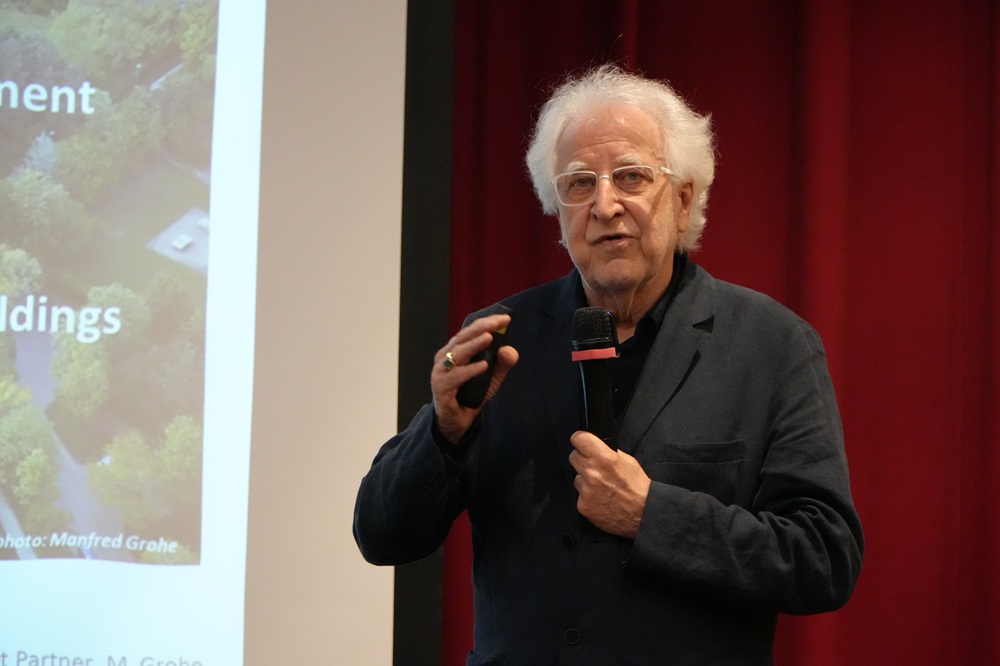To celebrate its 70th anniversary, Chung Yuan Christian University hosted the 2025 Taoyuan Pond International Forum on April 17, alongside a concurrent USR Achievement Exhibition from April 16 to 18.
The forum focused on three major themes: Water Culture, Ecological Cities, and Resilient Governance. It brought together experts and scholars from the Netherlands, Germany, the United States, Malaysia, and Taiwan to engage in an international dialogue on sustainability. Participants explored issues related to water resource management and the future of urban development, showcasing the university’s long-term dedication to University Social Responsibility (USR) and its practical achievements in both local engagement and global collaboration.

Chung Yuan Christian University has long centered its efforts on Taoyuan’s unique pond culture, promoting campus and community engagement through design education and cross-disciplinary collaboration. The university introduced the sustainable strategy of “One Pond, One School, One Community” to deepen local involvement. In 2025, CYCU was honored with the CommonWealth Magazine USR Award—First Prize in the Local Co-Learning Category, recognizing its achievements in educational innovation and community engagement.

In the forum’s “Water Culture” session, Associate Professor Inge Bobbink from the Delft University of Technology, Netherlands, shared insights drawn from observing the traditional water-use practices in Japanese villages, where a single stream of water serves multiple daily purposes. This “one water, multiple uses” approach inspired her students to rethink the relationship between water and everyday life. She emphasized, “The ideal form of design is when we borrow water for use, and then return it to nature’s cycle.”

Professor Chi-Peng Chen of Chung Yuan Christian University explained how the Taoyuan Plateau developed an intelligent pond system adapted to its unique natural conditions. These ponds not only provided a reliable source of irrigation but also became deeply intertwined with local settlements and spiritual beliefs, serving as vital carriers of regional culture. Since 2017, CYCU has made the pond system a core focus of its University Social Responsibility (USR) initiative, integrating it into teaching, research, and community engagement to create a practice-based platform that embodies both educational and sustainable value.

In the “Ecological Cities” session, German architect Joachim Eble shared urban planning experiences from Freiburg, Germany, and Southeast Asia, emphasizing that the development of sustainable cities must be approached from multiple dimensions—including urban density, integration with nature, public space, and energy systems.

In the “Resilient Governance” session, American architect David Waggonner drew on post-disaster reconstruction experiences in New Orleans to illustrate that cities should not view flooding merely as a problem to eliminate, but as an integral part of urban design. By integrating green spaces, groundwater management, and spatial adaptation strategies, cities can build resilient systems that coexist with water. He emphasized, “Truly effective water management lies in long-term strategies that integrate nature, design, and policy.”

Chung Yuan Christian University stated that, as a committed practitioner of University Social Responsibility (USR), it has long focused on integrating education with sustainability, while strengthening its impact through both local engagement and international collaboration. The 2025 Taoyuan Pond International Forum not only continues the spirit and achievements of its USR efforts, but also highlights the university’s key role in addressing global sustainability challenges.
Looking ahead, CYCU will continue to deepen its USR practices, embed sustainability into the core of education, and build an action-oriented platform that connects local roots with global vision—starting from Taoyuan, and contributing to resilient cities and a sustainable future worldwide.






自臺大教授謝銘倫(左)手中接任理事長。.jpg)




